Phase II Trial Confirms Potential of Venetoclax for Acute Myeloid Leukemia
By LabMedica International staff writers
Posted on 24 Aug 2016
Results of a Phase II clinical trial indicated that the candidate drug venetoclax was effective for treating patients whose acute myeloid (myelogenous) leukemia (AML) had relapsed or was resistant to chemotherapy.Posted on 24 Aug 2016
AML is a cancer of the myeloid line of blood cells, characterized by the rapid growth of abnormal white blood cells that accumulate in the bone marrow and interfere with the production of normal blood cells. The symptoms of AML are caused by replacement of normal bone marrow with leukemic cells, which causes a drop in red blood cells, platelets, and normal white blood cells. Symptoms include fatigue, shortness of breath, easy bruising and bleeding, and increased risk of infection. AML progresses rapidly and is typically fatal within weeks or months if left untreated.

Image: A photomicrograph of bone marrow aspirate showing acute myeloid leukemia (AML) (Photo courtesy of Wikimedia Commons).
In the Phase II trial, 32 patients with AML with a median age of 71 years received 800 milligrams daily of oral venetoclax. Venetoclax is a small molecule that belongs to a class of drugs called BH3 mimetics. It binds with great affinity and selectivity to BCL-2, an antiapoptotic protein that plays a role in many blood cancers. BCL-2 proteins keep the AML cells alive by binding to proapoptotic proteins. Venetoclax binds to BCL-2 and frees the proapoptotic proteins, thus rapidly and irreversibly forcing the AML cell to undergo apoptosis. In April 2016, venetoclax was approved by the [U.S.] Food and Drug Administration for the treatment of certain patients with chronic lymphocytic leukemia (CLL).
Investigators at Harvard Medical School (Boston, MA, USA) performed cytogenetic analysis, BH3 profiling, and next-generation sequencing to look for AML-related genetic mutations in the patients' samples collected at study entry.
They reported in the August 12, 2016, online edition of the journal Cancer Discovery that 12 patients had mutations in IDH (Isocitrate dehydrogenase) genes, and six had a high BCL-2-sensitive protein index. The overall response rate to venetoclax treatment was 19%; two patients had complete response (CR) and four had complete response with incomplete blood count recovery (CRi). The median duration of therapy in responders was 144.5 days, and the median duration of CR was 48 days. The four patients who had CRi had IDH mutations in their cancer cells. Response to the drug correlated with biomarker results, including indices of BCL-2 protein expression and BH3 profiling.
Senior author Dr. Anthony Letai, associate professor of medicine at Harvard Medical School, said, "This is significant as it supports the mechanism of action of venetoclax as an on-target inhibitor of BCL-2. Moreover, it offers the possibility of using BH3 profiling as a potential predictive biomarker for clinical use of BH3 mimetics."
"In this clinical trial, we found that even among pretreated patients whose AML was refractory to intensive chemotherapy there was evidence of exceptional sensitivity to selective BCL-2 inhibition, even to the point of complete remissions. This could be accomplished by a single oral dose of venetoclax daily and demonstrated the potential clinical activity of BCL-2 inhibition in AML," said Dr. Litai. "It is also worth noting that in this age of precision medicine, dominated by genomics, this is an example of the importance of functional precision medicine. CLL and AML lack genetic abnormalities related to BCL-2. Instead, their vulnerability to BCL-2 inhibition was identified using functional studies. This is support that functional studies need to be part of any mature precision medicine project."
Related Links:
Harvard Medical School













